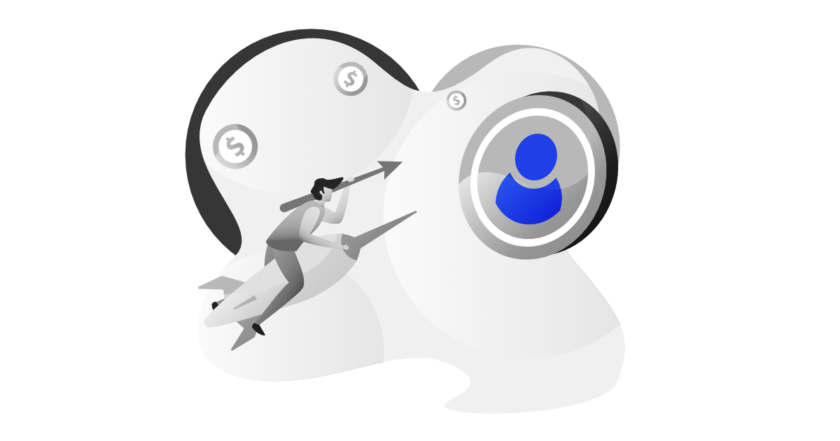“Who has ever seen an ad that convinced you that your microphone is listening in on your conversations?” That’s the introduction to the documentary“Hacked Privacy” available on Netflix. Your answer is probably “yes”. Don’t worry (or rather, worry a lot!) because that is the answer for most people.
It is not a matter of whether or not they are listening to your conversations, although in some cases it does happen. It is the collection of thousands of pieces of information about your behavior, at different moments of your day, your life, your activities, that feeds targeted advertising as we know it.
Eliminating targeted advertising can contribute to everything from increasing the privacy of the individual to improving communication vehicles. It can be a way to “fix the Internet.
Index
Targeted advertising vs. privacy
Two years have passed since the scandal involving Cambridge Analytica. To date, governments and regulatory bodies have not yet managed to find a way to control and make social networks and search engines adopt best practices regarding the collection and processing of user data.
One European study, for example, found that the gay dating app Grindr was sharing users’ data, including precise location, with 35 third parties. Other apps that you and I have on our smartphones right now do the same or even worse.
Many guidelines have been cogitated, norms have been established, and CEOs of the big Silicon Valley companies have been on sabbatical, but nothing very effective so far.
The problem lies in the business model of social networks and apps.
In January of this year, responding to a US congressman, Basecamp co-founder David Hansson suggested that the solution to our privacy problems was simple. If companies could not use data to target their campaigns what is the point of collecting it? This would automatically close the door to possible misconduct as well.
Right, we can come to the conclusion that we should ban companies from using personal data for advertising targeting. Radical? Yes! Necessary? No doubt about it.
In 2018 journalist David Dayen made a similar suggestion and the movement has been gaining supporters.
A profitable model
Let’s see: Google and Facebook get 83% and 99% of their revenue from selling ads. The same goes for other social networks and apps. These companies are in the behavioral advertising business, which allows companies to base their marketing campaigns on everything about user behavior, from sexual orientations, location, menstrual cycle (yes, even that), etc.
The behavioral advertising business has taken a leap and boosted adtech companies and data sharing between advertisers and content producers.
Instead of trying to fix all this (capturing, sharing, selling, and stealing personal information) why not attack the cause? Why not remove the incentive? Targeted advertising based on individual user data did not exist 10 years ago. Google itself continues to make billions with advertising tied to the search term, i.e. not targeted to a specific user. What if companies could no longer do it?
The only reason why Facebook and others are collecting this data, buying this data – stealing this data – is because the data is so valuable.
David Hansson
If you reduce the value of this data to almost zero, the whole incentive will disappear.
David Hansson
Targeted advertising as a tool for manipulation
Privacy is just the tip of the iceberg. The targeted advertising model also drives fake content on social networks. More importantly, it moves politics.
A 2018 study concluded that “today’s digital advertising infrastructure creates disturbing new opportunities for political manipulation and other forms of anti-democratic strategic communication.”
Sally Hubbard, one of the directors of the Open Markets Institute, a center for anti-monopoly studies, takes the argument further:
I honestly believe that we will not solve any of the problems we are concerned about, such as election interference and misinformation, unless we ban targeted advertising
The business model is the problem, there is no doubt about it.
Future without profiling
Now imagine if “miraculously” there were no more targeted advertising. How would things be different?
Some changes would be subtle. You would buy a pair of sneakers on Amazon without getting ads from Reebok or Nike for the next few months. Maybe you would see ads and brands you didn’t know before. Nowadays some advertisements are practically made to be discriminatory.
The end of targeted advertising does not mean the end of customization.
Netflix could still suggest series or movies based on your behavior on the platform. Disney+ could still suggest a Star Wars spin off if you have watched any of the films in the saga. Spotify could still suggest an album by Thelonious Monk after you listen to Miles Davis. What they could not do is trade their preferences with third parties.
Without data, social networks and apps would have to look for alternatives to recover this slice of their revenue. Maybe a premium version of Facebook or Instagram.
Segmented advertising and journalism
The last decade has been a tricky one for journalism, with waves of job losses year after year. The increase in behavioral advertising is not the only culprit, but it is part of the problem.
Newspaper ad revenue, rising steadily until 2006, has fallen since then. Where did the advertisers take their budgets? Overwhelmingly, for Facebook, Google and the advertising infrastructure they control. Take away the targeting advantage and marketers would have to go back to paying for publications to reach their audiences, so-called “contextual advertising.” Getting rid of microtargeting would not alone restore journalism to its glory days, but it could help.
Read also: Why newspapers should not give free news during crises?
At the same time that ad tech networks began to dominate web advertising, traditional forms of advertising and newspaper subscription revenue began to decline. In the rush to stop the bleeding, many media outlets have partnered with ad tech companies to gain access to their expanding networks.
These initial decisions set news outlets on a path where they sacrificed readers’ privacy, reduced their ability to maintain direct relationships with advertisers, and ultimately put their survival in the hands of middlemen like Google and Facebook.
The result is that as online advertising networks become more centralized, the old model of a free and independently managed print media is replaced by one in which giant technology companies control users’ data.
Read also: Responsibility and privacy in the press
Other forms of monetization
Few people actually like the advertising. People like the free. They like to be able to watch videos or communicate with their network without having to pay for it. This fuels the need for social networks and apps to seek to monetize their platforms.
Many companies, especially those already subject to regulation, have taken privacy and data collection seriously and asked their visitors if they want to share their data with third parties. 90% of users do not want to share data with third parties. These companies are already looking for a way to have a direct relationship with their public.
On the other hand, we know that targeted advertising has also been a good source of revenue for content producers. Google itself recently announced that disabling third-party cookies could lead to revenue losses of up to 52% for vehicles.
However, academic studies suggest that this impact is smaller (around 4%). In 2019, The New York Times stopped displaying targeted advertising in Europe and its revenue was not affected.
Procter & Gamble, the world’s largest advertiser cut in 2017/2018 (can’t say about 2019) part of its investment in digital media, especially targeted campaigns, as it considers them money thrown away. Among the reasons alleged were the low display time of the ads (on average 1.7 seconds) and high repetition rate.
Read also: The age of browsers in digital advertising
Manipulation of the ads market?
Many players present statistics that instigate and move the market in their favor.
Facebook itself admitted that it had miscalculated the average time spent by viewers watching videos on its site, attracting the attention of big buyers and marketers. That’s for no less than two years.

On the other hand, Mark Zuckerberg says that Facebook should provide small businesses with ways to use ads in a more sophisticated way. Hansson himself (Basecamp) has said that he has had a lot of success with Facebook Ads, more than with any other type of campaign (although today he no longer does this because he finds it objectionable).
Programmatic Media
Most digital advertising today violates Europe’s GDPR (and other data protection laws around the world) at some point. One of the big problems is the “real-time bidding” system that connects advertisers to users.
Usually, when there is an opportunity to show an ad, dozens, hundreds or thousands of companies compete in an instantaneous, automated auction. In the course of this auction, all these companies (plus a dozen or so intermediaries) get at least temporary access to your personal data.
GDPR generally prohibits companies from processing user data without consent. Activists argue that it is simply impossible for users to give their consent to real-time bidding when there is no way of knowing which companies are involved in the auction. This could be one of the largest data use violations ever seen.
The law however offers a potential loophole: companies can process user data if necessary for their “legitimate interests . . except where those interests are superseded by the interests or fundamental rights and freedoms of the data subject.” In other words, it will depend on how the courts interpret the law in each case. The LGPD that will go into effect in Brazil in May 2021 does not even mention the terms “auction” or “advertisement.” Possibly it will have its loopholes for interpretation as well.
Scenario without targeted advertising
It is clear that we will have victims should this change occur. Companies, especially adtechs would have to fight hard to adapt. Google would continue to make a fortune selling ads based on the terms people search(it currently accounts for about 60 percent of its revenue) and with YouTube video advertising.
Facebook… well, they would still have their huge user base to pursue other forms of monetization.
All these businesses and the Internet would still continue to exist. For Carnegie Mellon computer science professor Timothy Libert:
What would not exist is this strange anomaly where a few advertising companies – which is what they are – are the biggest and most powerful companies on the planet.
That’s it. What do you think of the proposal? Leave your opinion on the social networks or contact us if you prefer.
Continue reading: Objectivity and journalistic perspective
